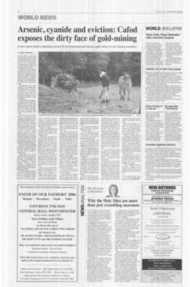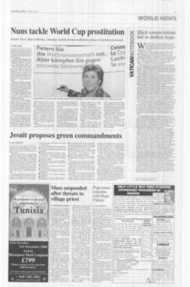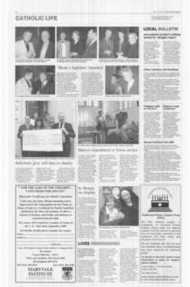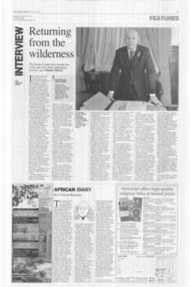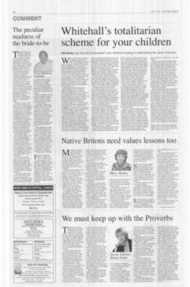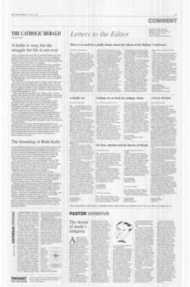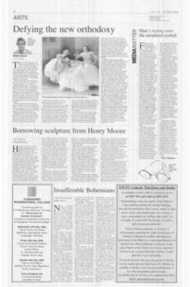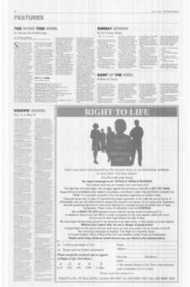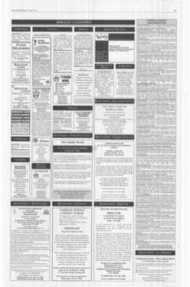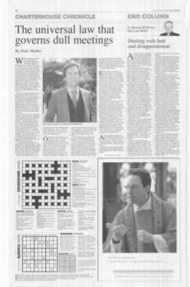Page 3, 19th May 2006
Page 3

Report an error
Noticed an error on this page?If you've noticed an error in this article please click here to report it.
Tags
Share
Related articles
Bishops Awaken 'sleeping Giant Of The Laity' Over...
Joffe Plans New Fight For Law On Euthanasia
Church Launches Struggle To Kill Off Euthanasia Bill
From Mr Michael Lord
In Coverage Of Joffe Bill
Assisted suicide Bill wrecked by the Lords
Euthanasia campaigners blame biggest campaign in Catholic Church's modern history for failure of Lord Joffe's Private Member's Bill to progress to Commons
BY SIMON CALDWELL
CATHOLIC and Anglican leaders have been accused of mounting a "very unpleasant campaign" to kill off a Bill to legalise assisted suicide.
Euthanasia campaigners blamed the Church for the defeat of the Assisted Dying for the Terminally Ill 13111 peers voted by 148 to 100 to delay the Second Reading of the Bill after a seven-hour debate in the House of Lords. The vote last Friday has wrecked any prospect that the Bill could become law in the current parliamentary session.
The outcome was seen as a victory for the Catholic Church in England and Wales which in March mounted one of the largest campaigns in its modern history to prevent the Bill from becoming law.
Opening the debate, Lord Joffe, the sponsor of the Bill, urged politicians to recognise that the heavy mailbags that they had received were the fruit of the Church's efforts.
"The letters come from some of the relatively small number of deeply committed Christian worshippers and are the result of a massive political campaign by the Churches, led by the Catholic Archbishop of Cardiff, which included the dissemination of 500,000 leaflets or DVDs asking recipients, among other things, to write to peers and MPs to express their opposition to the Bill," the Liberal Democrat peer said.
"The irony is that research and public opinion surveys, including a 2004 NOP survey, have found that about 80 per cent of Christians of all denominations support assisted dying."
Hundreds of anti-euthanasia campaigners — including terminally ill patients — protested outside the Lords during the debate while earlier in the day a petition against the Bill, signed by 100,000 people, was handed into the Prime Minister's residence at 10 Downing Street.
Afterwards, Baroness Jay of Paddington, a supporter of the Bill, blamed the Churches for the failure of the proposals to progress to the House of Commons. "What has happened today is that the Churches have mobilised what is a very unpleasant political campaign outside the Lords . which nonetheless has affected people within it," she told Channel 4 News "This is a blocking of the democratic process."
In the run-up to the debate, Cardinal Cormac MurphyO'Connor, the president of the Bishops' Conference of England and Wales, twice left the Wellington Hospital, London, where he was being treated for a leg infection, to speak on the radio and to help to draft a joint letter to The Times newspaper with Anglican leader Dr Rowan Williams.
"We believe that all human life is sacred and God-given with a value that is inherent, not conditional," the pair said in their letter published last Friday. "We urge legislators to withhold support for this Bill so as to ensure that British law continues to safeguard the principle that the intention to kill, or assist in the killing, of an innocent human being is wrong.
"Such a Bill cannot guarantee that a right to die would not, for society's most vulnerable, become a duty to die. Were such a law enacted, the elderly, lonely , sick and distressed would find themselves under pressure, teal or imagined, to ask for an early death."
Archbishop Peter Smith of Cardiff, who led the campaign as chairman of the bishops' Department for Citizenship and Christian Responsibility, told Radio 4 that evening that by implicitly sanctioning the principle that some lives are unworthy of living the Bill would have struck at the "very heart of what gives us our freedom".
On Monday, he released a statement to say the defeat of the Joffe Bill was "very important and welcome", "I would like to thank all those in the Catholic community whose active engagement made a significant contri bution ," the archbi shop said. "However, this issue has not gone away, and inevitably will return to Parliament at some point."
He said he hoped the Care Not Killing alliance of more than 30 medical and religious groups opposed to euthanasia would continue to campaign for better palliative care and against a change in the law_ Lord Joffe's Private Member's Bill was modelled on the 1997 Oregon Death With Dignity Act, under which doctors are allowed to prescribe lethal doses of medicine so long as they do not administer the drugs directly. In the Lords, it was opposed by 14 Anglican bishops, including Dr Williams and his predecessor, Lord Carey of Clifton. who said that assisted suicide could come to be treated as casually as abortion.
Lord Brennan warned peers of a new network of "death clinics" while Baroness Finlay of Llandaff, president-elect of the Royal Society of Medicine, said the Bill would take the country to the "very brink of euthanasia in one fell swoop".
A spokesman for Dying With Dignity, a euthanasia lobby group, said that its campaign to change the law would continue.
Editorial comment: Page 11
blog comments powered by Disqus





